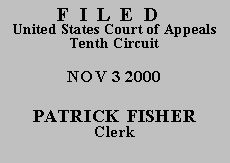 UNITED STATES COURT OF APPEALS
UNITED STATES COURT OF APPEALS
 UNITED STATES COURT OF APPEALS
UNITED STATES COURT OF APPEALS
TENTH CIRCUIT
| UNITED STATES OF AMERICA, | |
| v. | No. 00-3073 |
| LORENZO F. MARTINEZ, aka Jesse, aka Pedro Rivera, | (D.C. No. 98-CR-40066-2)
(D. Kan.) |
ORDER AND JUDGMENT(*)
Before BALDOCK, HENRY, and LUCERO, Circuit Judges.(**)
Pursuant to a plea agreement, Defendant pled guilty to four counts of possession with intent to distribute a mixture or substance containing a detectable amount of cocaine in violation of 21 U.S.C. § 841(a)(1). Defendant subsequently filed a motion requesting that his sentences in this case run concurrently with an undischarged 57 month sentence for aggravated reentry after deportation. The district court sentenced Defendant to 46 months imprisonment on each count to run concurrently. The district court, however, denied Defendant's motion and imposed the instant sentences consecutive to the undischarged 57 month sentence. Defendant appeals.
The Government argues Defendant's waiver of his right to appeal precludes this challenge. The written plea agreement contains the following waiver:
4. Defendant freely, voluntarily, knowingly and intentionally waives any right to appeal or collaterally attack any matter in connection with this prosecution and sentence.
A. The defendant is aware that 18 U.S.C. § 3742 affords a defendant the right to appeal the sentence imposed. Acknowledging that, the defendant knowingly waives the right to appeal any sentence within the guideline range applicable to the statute of conviction as determined by the court after resolution of any objections by either party to the Presentence Report to be prepared in this case, and the defendant specifically agrees not to appeal the determination of the court in resolving any contested sentencing factor. In other words, the defendant waives the right to appeal the sentence imposed in this case except to the extent, if any, that the court may depart upwards from the applicable sentencing guideline range as determined by the court.
Aplee's Supp. App. Vol I at 11.
"A defendant's knowing and voluntary waiver of the statutory right to appeal his sentence is generally enforceable." United States v. Rubio, 2000 WL 1629986, *2, __ F.3d __, __ (10th Cir. 2000) (quoting United States v. Black, 201 F.3d 1296, 1300 (10th Cir. 2000)). Nothing in the record suggests Defendant did not knowingly and voluntarily agree to the waiver contained in his plea agreement. In the written petition to enter a guilty plea, Defendant states that he entered his guilty plea "freely and voluntarily." Defendant does not contest the appropriateness of the 46 month sentences and does not attack the validity of the plea agreement. Instead, despite expressly waiving his right to appeal, Defendant now argues the district court erroneously imposed his sentences in this case consecutive to his undischarged sentence. Under the plain terms of the plea agreement signed by Defendant and his attorney, however, Defendant clearly waived his right to appeal the sentence imposed. Because we conclude Defendant knowingly and voluntarily waived his right to appeal, we lack jurisdiction over this appeal. See Rubio, __ F.3d at __. Therefore, the appeal is
DISMISSED.
Entered for the Court,
Bobby R. Baldock
Circuit Judge
,
*. This order and judgment is not binding precedent, except under the doctrines of law of the case, res judicata, and collateral estoppel. The court generally disfavors the citation of orders and judgments; nevertheless, an order and judgment may be cited under the terms and conditions of 10th Cir. R. 36.3.
**. After examining the briefs and appellate record, this panel has determined unanimously to honor the parties' request for a decision on the briefs without oral argument. See Fed. R. App. P. 34(f); 10th Cir. R. 34.1(A)(2). The case is therefore ordered submitted without oral argument.